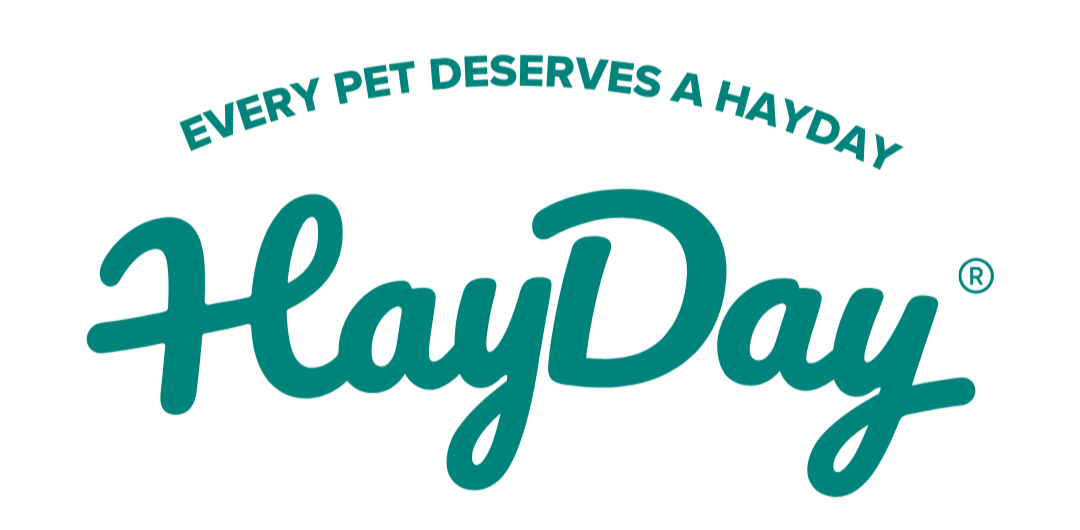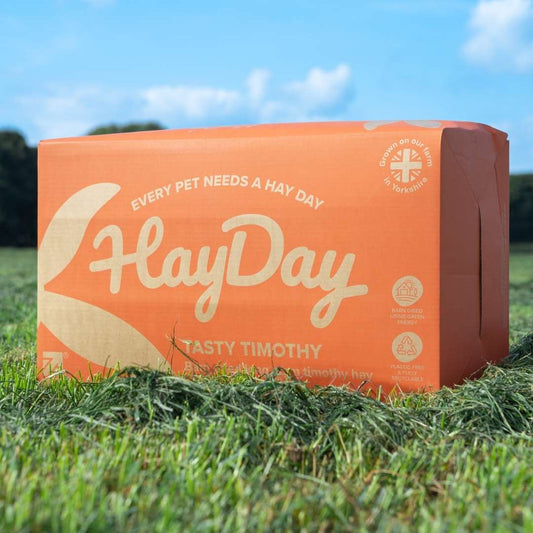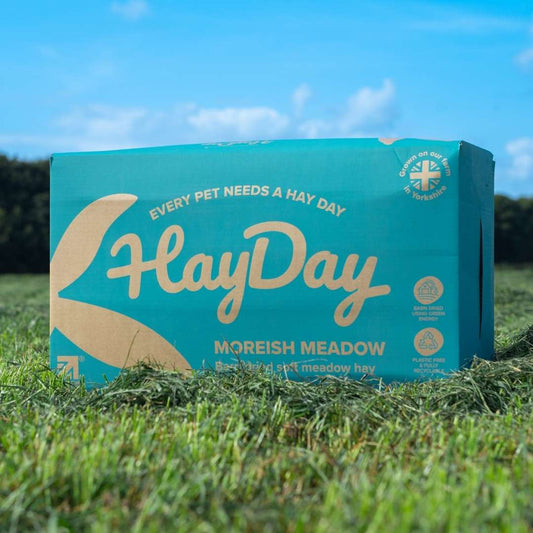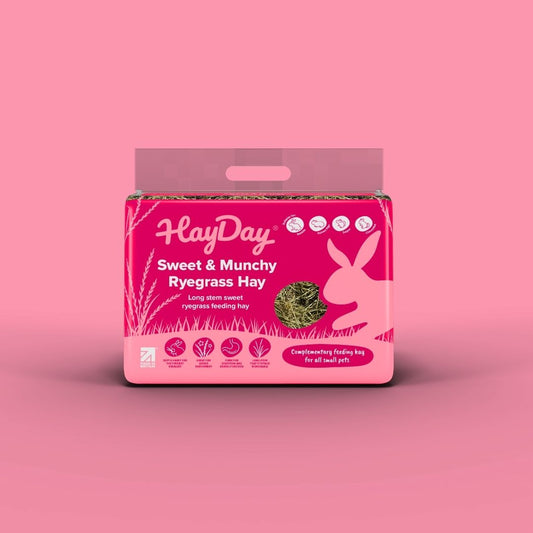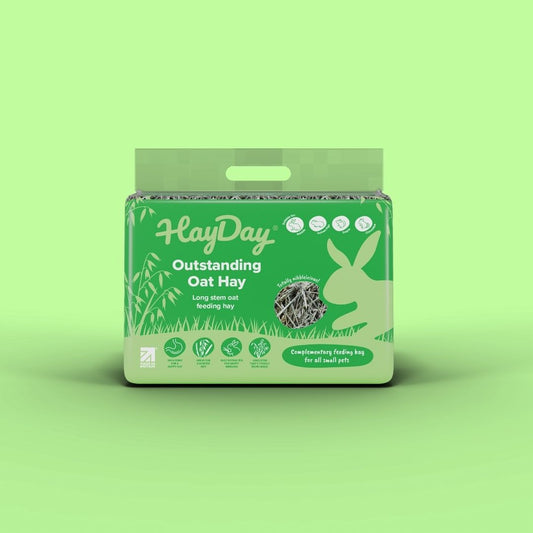What are the best foods for guinea pigs?
Providing the correct diet is crucial for the health and wellness of guinea pigs when it comes to their food.
At HayDay, hay is what we do best, so we understand the importance of feeding your guinea pig the correct foods in order to keep them happy. You’ll learn about essential guinea pig food, how to balance their diet, and which treats to offer additionally.
Shop Now > Premium hay for guinea pigs.
What Do Guinea Pig Eat? - Overview
-
A balanced guinea pig diet should consist of 80 to 90% hay, complemented by pellets/nuggets and leafy green veggies.
-
Fresh food like vegetables high in vitamin C are essential, as guinea pigs can't naturally produce their own.
-
Avoid toxic foods such as chocolate, onions, and certain fruits while ensuring adequate vitamin C through fruit, vegetables and fresh produce.
Best Diet for a Healthy Guinea Pig
A guinea pig’s diet is fundamental to their overall health, consisting of three primary components:
-
80% to 90% good quality, long stem hay
-
5% to 10% pellets or nuggets (especially those with natural ingredients and high in Vitamin-C)
-
5% to 10% vegetables and leafy greens
-
Unlimited access to fresh and clean water
Guinea pigs should be offered unlimited access to hay as its high fibre content supports their dental, digestive and gut health.
High quality pellets or nuggets are also a crucial aspect of your piggies diet, as they provide essential vitamins and minerals. Choosing pellets which are high in Vitamin-C is worth noting too, as guinea pigs can't naturally produce their own Vitamin C.
Some Vitamin C-rich vegetables include bell peppers, pak choi, kale and watercress.
Top Quality Grass Hay
Making up about 80% to 90% of their diet, fresh feeding hay should be the main thing you feed your guinea pigs. It supplies essential fibre, aiding digestion and helps prevent dental problems.
Timothy Hay is a popular choice for its high fibre and protein content.
Other suitable hay types include Meadow Hay and Ryegrass Hay.
Guinea pigs should have unlimited access to high-quality hay, replenished daily. At minimum a hay pile the size of your guinea pig’s body should be given each day.
Here are some of the best types of hay to feed your guinea pigs.
Timothy Hay
This is the most popular choice among guinea pig owners. This long stem Timothy Hay is great for guinea pigs dental, digestive and gut health and is packed with fibre and high protein, making it perfect for adult guinea pigs.
Meadow Hay
Meadow Hay is softer in texture and great for your guinea pig to play and burrow in. Meadow Hay is also high in fibre, and a great alternative to Timothy Hay for fussy guinea pigs. It also makes a great bedding hay too!
Ryegrass Hay
Ryegrass Hay offers moderate levels of fibre and is great to feed alongside other hay types for enrichment or for added nutrition. It’s best fed alongside Timothy Hay or Meadow Hay.
Alfalfa Hay
Alfalfa Hay is higher in protein and calcium to support with health and development. Best suited for young (up to 6 months), pregnant and nursing or ill guinea pigs. Adult guinea pigs can be fed Alfalfa Hay but in moderation as a treat.
Oat Hay
Oat Hay is a crunchy, highly nutritious and high fibre forage designed to support digestive health and natural feeding instincts. Oat Hay is an excellent hay option to be used in addition to other hay types (such as timothy or meadow hay) or to encourage foraging.
Choosing the Best Hay for Your Guinea Pigs
When selecting guinea pig hay, look for:
-
Colour and Smell: Choose hay that is green and fragrant, which indicates freshness.
-
Dust-Extracted: Avoid dusty hay to protect your guinea pig’s respiratory health.
-
Taste and Texture: Guinea pigs enjoy hay that is long stem and extremely palatable.
You can find all these high-quality hays in our online shop. Providing your guinea pig with the right type of hay is essential for their health and happiness!
What Vegetables Can Guinea Pigs Eat?
Guinea pigs can eat a range of vegetables, and including fresh vegetables in their diet is vital for a guinea pig’s health, especially the ones high in vitamin C! The best veg for guinea pigs are:
-
Kale
-
Spinach
-
Spring Greens
-
Romaine lettuce
-
Cilantro
-
Pak Choi
-
Broccoli
-
Carrots
-
Peppers
These all provide a rich source of vitamins and minerals.
Vegetables high in vitamin C, such as red and green peppers and broccoli, are particularly beneficial.
Offer pet guinea pigs 1-2 cups of mixed vegetables daily on morning and evening feeds. This variety supplies essential nutrients and keeps your guinea pigs diet interesting and enriched.
As with feeding any new foods, introduce new vegetables gradually (over a period of 7 to 14 days) and monitor for any digestive upset.
What Fruits can Guinea Pigs Eat?
Fruits can be a delightful addition to a guinea pig’s diet but should be offered sparingly, due to high sugar content.
Treats should be given sensibly and in moderation. Offering fruits several times a week is sufficient.
Safe Fruits for Guinea Pigs
Not all fruits are safe for guinea pigs, but many guinea pigs can enjoy in moderation.
Safe options include carrots and apple quarters. Fruits rich in vitamin C, such as kiwis, strawberries, and citrus fruits, are particularly beneficial.
Foods to Avoid Giving Your Guinea Pig
Understanding what to avoid is as important as knowing what to feed your guinea pigs. Some foods are harmful or toxic and should be strictly off-limits.
Animal proteins, processed foods, chocolate, garlic, onions, avocados, and raw potatoes are particularly dangerous.
Fruits like citrus and unripe tomatoes pose toxicity risks and should be avoided. Plus, human foods like hot peppers can irritate their digestive systems. Always research new foods before offering them to ensure safety.
Preventing health issues is crucial, so knowing which foods are harmful protects your pet. Avoiding these dangerous items ensures your guinea pig stays healthy and happy.
The Importance of Vitamin C
Vitamin C is vital for guinea pigs as they cannot produce it themselves. A deficiency can lead to scurvy, which causes lethargy in guinea pigs.
Ensure your guinea pig gets enough vitamin C by feeding them Vitamin C-rich pellets and veggies. Always consult your vet for further feeding advice.
Next Steps
Summary
In summary, a balanced diet is the foundation of a healthy and happy guinea pig.
You can ensure your pets receive all the essential nutrients they need by incorporating good quality hay, pellets and fresh, leafy vegetables into their daily diet. Avoid harmful foods and monitor their health closely to keep them thriving.
By following our helpful guide, you can be confident in your ability to care for your furry friends effectively.
Shop Now > Premium, barn dried and dust extracted hay!
Relevant Links
Best Bedding Hay for Guinea Pigs
Guinea Pig Health: How To Spot Symptoms
Frequently Asked Questions
How much hay should I feed my guinea pig daily?
Guinea pigs should have unlimited access to high quality, fresh hay daily - which they should have unlimited access to, at free choice. This ensures they receive the necessary fibre for their health.
Can guinea pigs eat fruits every day?
Guinea pigs can eat fruits, but they should be fed sparingly,. Moderation is key to keeping them healthy, as fruit is typically high in sugar.
What vegetables are safe for guinea pigs?
Guinea pigs can safely consume leafy greens such as kale and romaine lettuce, along with vitamin C-rich vegetables like bell peppers and broccoli. Including these in their diet is essential for their health.
